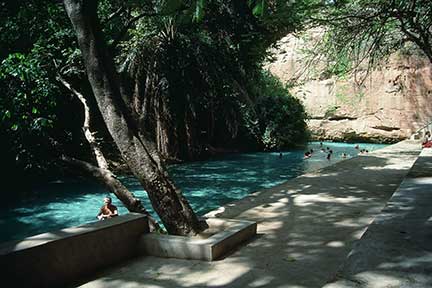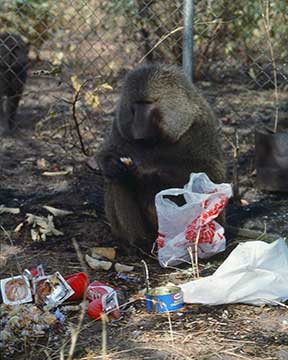Yankari Game Park & Wikki Warm Springs
 December 22 - 23, 1987
December 22 - 23, 1987
Wikki Warm Springs, in the Yankari Game Reserve in Nigeria, is a veritable river flowing out from beneath a sheer rock cliff. The water is so pure that it's bottled and sold. Tens of thousands of gallons flow out every day at a constant 75 degree temperature. The water comes from under the cliff into a wide rock basin floored with white sand that varies in depth from one to seven feet. The whole area is shaded from the hot African sun by tall verdant trees. Baboons were the only thing that kept it from being utterly perfect. We were warned that they might swing or sneak down as people swam and make off with their things. We set a guard and fortunately, weren't much bothered by them.
It was the best place to swim I've ever found. I loved to float down 200 yards or so with the current, then strain myself swimming back up to the rock face.
We took a guided trip around the preserve and saw hippos, bushbuck, crocodile and various other African beasts, but unfortunately no elephants. The park was heavily forested and elephants were hard to see when not near a river.
 When we ate, the baboons joined us, not shy in the least. They had an immense sense of entitlement. If you took your eyes off the food for a second they'd grab it and run. They were accomplished and very competitive thieves.
When we ate, the baboons joined us, not shy in the least. They had an immense sense of entitlement. If you took your eyes off the food for a second they'd grab it and run. They were accomplished and very competitive thieves.
In the small park museum, I struck up a conversation with the curator. He had been born and raised in the area. I asked him about poaching.
"Yes," he said. "It is a major, major problem. Every month animals are killed in the park. The poachers have guns and vehicles. To find the animals, they start large fires and burn the forest. We have very few game guards and no guns. Most guards do not even have shoes.
"Last year," he continued, "the game guards caught some poachers soon after a kill. The poachers did not run; they fought back. One of our guards was killed. His wife and nine children live in the village, and now have no means of support. The government was supposed to give them money, but after a year of waiting they were told that their files had been lost and nothing could be done."
I couldn't believe it. "What happens to poachers if they are caught?" I asked.
"If they are caught, they usually try to bribe the officials. Some go to trial, but few are convicted. If they are convicted, they may spend up to six months in jail and pay a $500 fine. Then they are set free and return to poaching. A single elephant tusk is worth thousands of dollars, and the risks are small. There is almost no other way in this country for a man to make so much money so easily.
"This museum used to have an elephant tusk for visitors to view," he continued, "but the poachers broke in and stole it. One night, they even entered my house with guns, thinking perhaps I had some ivory hidden. They have threatened to kill anyone who makes trouble for them."
"Who buys the ivory?" I asked.
"Mostly white people like yourself. Before the whites came to Africa, animals were killed for food and other things people needed. These poachers are from a long line of proud and successful hunters, but now there are more people than animals. It is hard to change their ideas."
I remembered pictures I'd seen in National Geographic of dozens of dead elephants lying on the plains with only their tusks removed. Elephants are endangered. Elephant populations are decreasing precipitously.
"Doesn't the government do anything?" I asked, feeling helpless and furious that so many animals were being slaughtered for greed. "Nigeria is a relatively rich country. The government could afford to help."
"The government does almost nothing," he said. "The previous government tried to enforce the laws and make stiffer penalties. We were even promised guns. After five years, the poaching nearly ended and the men found other ways to make a living. But this government wants to modernize at all costs, and will spend almost nothing for conservation or animals. I have written many letters to try to convince the officials that the animals are valuable because tourists will pay to see them, but no one is looking that far into the future."
"These poachers, are they local people?" I asked. "Do you know them?"
"Yes," he answered. "They are from the village."
"But you are from the village. These must be your neighbors, people you have known since childhood, that are killing animals you want to protect and threatening your life?"
"Yes," he said.
I could barely conceive of the courage and strength of purpose of this man, standing up for what he believes against so many and with so little financial or moral support.
"Isn't there anyone who can help?" I asked. "Perhaps National Geographic or some wildlife conservation organization?"
"I have written to these places," he said, "but they have limited funds and are far more interested in East Africa because there are so many more animals there. I heard that the game guards there have uniforms, guns, shoes, and even airplanes. We cannot hope for these things because our guards make little money and only do the job because they want to protect the animals. For this they risk their lives. The poachers have money and everything they want. It is a bad situation."
"There must be someone who could help!" I exclaimed.
"Are you rich? Do you know anyone who could help?" he asked.
"I am not rich," I responded, "but perhaps I could help a little. If you had money, how would it be used?"
"It would be used to protect the animals," he responded. "First we would buy shoes for the game guards so they could better patrol and run through the bush if necessary. Then, we would try to buy one or more guns so we could protect ourselves as we try to arrest the poachers."
I felt sad and depressed. Perhaps the animals are doomed. But I was inspired by this little man. Despite the apparent hopelessness of the situation, he and others hadn't given up. They continue fighting for a world in which even our children's children will be able to see wild elephants.
P.S. A few years later, I had a 4th grade student from Nigeria, Emeka. His father was a doctor in Anchorage. He was amazed that I had visited his country, and he became one of my all-time favorite students. I told him about Wikki Warm Springs and hope he and his family have since been able to visit there and swim.
Go on to Mosquito Repellent
Source: www.SusanCAnthony.com, ©Susan C. Anthony
